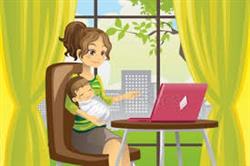5 Tips for Working Remotely from Home and Caring for Children During COVID-19

If we could press rewind and go back to mid-March, I wonder what we would have been doing. The sudden and abrupt transition to working from home and having to juggle roles of employee, parent and teacher all at once was certainly something most of us were not prepared for Most of us had little time to plan how we would design our work space, daily schedules and balance work and family under one roof. If this sounds like your “new normal,” you are not alone. Following are a few tips from an article by Holly Hatton-Bowers and Carrie L. Hanson-Bradley, Assistant Professors at the University of Nebraska.
Tip 1: Acknowledge Emotions
Emotions are normal and healthy and give us clues to what we may need to feel better. It may be helpful to “name it to tame it.” We often feel emotions in our bodies first, such as tightness in our chest or a stiff neck. Stop for a minute, pay attention to what we feel in our bodies and then name our emotion.
Keep in mind that emotions are not forever, “name it, tame it” and move on. Judging ourselves for having emotions only makes us feel worse.
Tip 2: Manage Expectations
It is difficult to juggle all of your roles at the same time, so do not expect to be able to fulfill all the roles you play at the same level you did before COVID-19. It can be helpful to understand each individual manages change differently; and this is particularly true in families adjust to the newness of working from home, parenting and teaching at the same time. Some will embrace it as a new opportunity for creativity while others feel overwhelmed.
What about Parenting Expectation?
Daily routines will be different for each individual family. Whether it be educational activities, or family time together, what young children need more than ever right now is time to connect, cuddle, have a routine with some flexibility and to feel safe.
Can you find ways to make every day activities fun for your child? Perhaps the family meal time could turn into a picnic on the floor. Maybe you could make a game of sorting socks when doing the laundry. Try and be intentional about when you need to work and when to play or be with your children. It’s like putting deposits in the bank, when children receive moments of our undivided attention, then they are more likely to feel okay when parents need to move away to focus on work.
Tip 3: Create a schedule
Sit down and create a schedule that works for your family. Keeping in mind it is good to allow for flexibility. Schedule in work time and time for household chores. Time for children to play and do chores and school work too. If there are two parents in the home, the adulst could alternate work hours so as to keep children safe as well as giving them the parent connection time they need most.
Tip 4: Practice Self-Care
It is healthy to take time away to focus on what you need as an adult. Yet, when we are under stress, self-care is one of the first things that gets pushed aside. Here are a few strategies for self-care:
- Listening to music
- Taking time to virtually connect with friends and family
- Spend time in nature
- Exercise
- Practice deep breathing or meditation
- Eating healthy
- Reading or drawing
- Getting adequate sleep and waking up the same time each day
- Practice positive thinking and/or practice gratitude
Tip 5: Be Gentle with Yourself
We are collectively experiencing a worldwide crisis, and crises trigger our brains into fight, flight or freeze mode. That means our brains are focused on surviving, not thriving. So it is normal to feel like you aren’t functioning at your peak level. Have you felt forgetful lately, not as motivated or find yourself not know what day it is? It may be your brain’s way of protecting you in this time of stress.
Soon, you will be able to look back on this time and process what has happened, but in-depth processing happens only after you feel emotionally and physically safe. So in this time of crisis, be gentle with yourself (and with others). Self-compassion creates space where mistakes are viewed as valuable learning opportunities, tiny victories call for huge celebrations and we can acknowledge our suffering without criticizing ourselves for being human.


